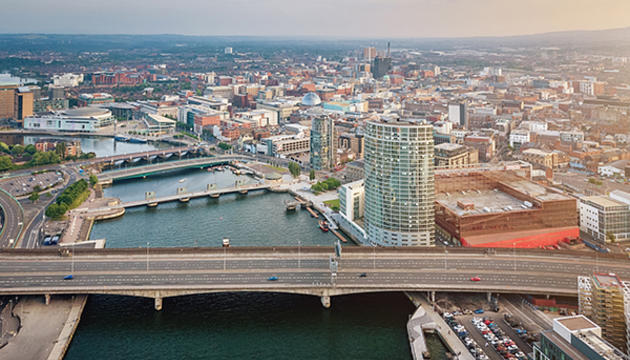
Energy Transition and Climate Resilience Commission to be established for Belfast
11th April 2009 - 00:00
Belfast will soon have its own Energy and Climate Commission thanks to a unique, five-year, three-city £3.5 million project.
The Place-based Climate Action Network (PCAN) was introduced at a networking event at the Parliament Buildings in Stormont on Tuesday. It will establish Commissions in Belfast and Edinburgh and extend the Leeds Climate Commission, which was the first to be created. The Commissions will help the local delivery of the UK’s climate change objectives by supporting action in cities through a partnership made up of the private, public and civic sectors.
The PCAN project is funded by the Economic and Social Research Council. It will place a particular emphasis on finance and business, including investments in building energy efficiency, renewable energy and low-carbon projects, and on highlighting business opportunities along with social and economic benefits for communities.
A key dimension is to ensure that any low carbon energy transition creates more and better jobs and that the benefits are distributed so that no community is left behind.
The PCAN project team also met with the Lord Mayor of Belfast, Cllr Deirdre Hargey, at a reception at Belfast City Hall earlier on Tuesday, who greeted the opportunities for Belfast.
Cllr Hargey said: “I welcome and support this partnership between Belfast City Council and the researchers on the Place Based Climate Action Network project. Climate breakdown is a reality and one Belfast city takes extremely seriously. While Brexit currently dominates politics and the news, it will pale into insignificance when compared with the impacts of climate breakdown.
“The PCAN project is important in not only enabling Belfast to become resilient and prepare for climate related risks but also in working with businesses, the public sector and community and voluntary groups in identifying the many benefits in terms of jobs, investment, technological innovation and cost savings of transitioning away from fossil fuels.”
John Barry, Professor of Green Political Economy and Belfast lead of the PCAN project, said: “Addressing climate breakdown is not only an urgent issue all societies need to grapple with, but also one that creates multiple opportunities for positive changes in how cities and their citizens live and work. The PCAN project will have five years to create a shared vision and plan for the city in making it climate resilient and mapping effective low carbon transition pathways.”
Sam Fankhauser and Andy Gouldson, co-directors of the project, spoke at the Stormont event, which was enthusiastically received by an audience of more than 60 including representatives from the business, public and financial sectors.
“We are delighted with the support for the PCAN project from Belfast City Council and excited about the project producing practical steps to enable Belfast to adapt and transform to address climate breakdown and transition away from fossil fuels.
“The aim of the new network is to inform and promote climate change action at the local level and to make the most of the opportunities for local people and business.”
Research by Andy Gouldson has identified that Belfast could cut energy bills by £105 million per year if it invested in all the profitable and low carbon options in terms of cost savings. Belfast households could save £46 million annually and 1,579 hours of employment would be created.
While the PCAN team hope that Belfast can learn lessons from the experience of the Leeds Climate Commission (launched September 2017), how the Belfast Commission develops will be driven by the particular needs of the city. Reaction to the Stormont event, hosted by Green Party leader Clare Bailey MLA for South Belfast and Green Party leader, was extremely positive.
“ ‘When can we get started?’ was the overwhelming response I got on Tuesday night,” said John Barry. “People can’t wait to do this, and neither can I.
“The scale of the benefits and the urgency of the energy transition means that we need all relevant stakeholders involved to make this happen. The Belfast Energy Transition and Climate Resilience Commission will bring together representatives from business, finance, council and local government as well as environmental, faith and trades union to identify and prioritise the necessary actions required to ensure Belfast is ready for the challenges and opportunities in its transition to a low carbon city.”
Read more about the scope for low carbon development in Belfast here: http://candocities.org/energy-and-carbon/belfast
For further information about the Belfast Energy Transition and Climate Resilience Commission, contact j.barry@qub.ac.uk and follow @PCANcities on Twitter
Ends
Contacts for press
Belfast Energy Transition and Climate Resilience Commission:
John Barry
Professor of Green Political Economy
School of History, Anthropology, Philosophy and Politics
Queens University Belfast
E: j.barry@qub.ac.uk
PCAN:
Kate Lock
Communications Officer
E: K.M.Lock@leeds.ac.uk tel 07792 633984
- The Economic and Social Research Council (ESRC) is part of UK Research and Innovation, a non-departmental public body funded by a grant-in-aid from the UK government. For more information visit www.ukri.org.
- The ESRC is the UK’s largest funder of research on the social and economic questions facing us today. It supports the development and training of the UK’s future social scientists and also funds major studies that provide the infrastructure for research. ESRC-funded research informs policymakers and practitioners and helps make businesses, voluntary bodies and other organisations more effective.
- UK Research and Innovation is a new body which works in partnership with universities, research organisations, businesses, charities, and government to create the best possible environment for research and innovation to flourish. We aim to maximise the contribution of each of our component parts, working individually and collectively. We work with our many partners to benefit everyone through knowledge, talent and ideas.
- Operating across the whole of the UK with a combined budget of more than £6 billion, UK Research and Innovation brings together the seven Research Councils, Innovate UK and a new organisation, Research England.
- Leeds Climate Commission (http://leeds.candocities.org) was launched on 7 September 2017 by former Environment Secretary and Chair of the UK Committee on Climate Change, Lord Deben
- 24 key businesses and organisations are represented on the Commission, which is a public-private-civic initiative that aims to climate action across Leeds by fostering collaboration on projects that result in a measurable contributions to the city’s climate reduction targets.
- Read more about PCAN here:

